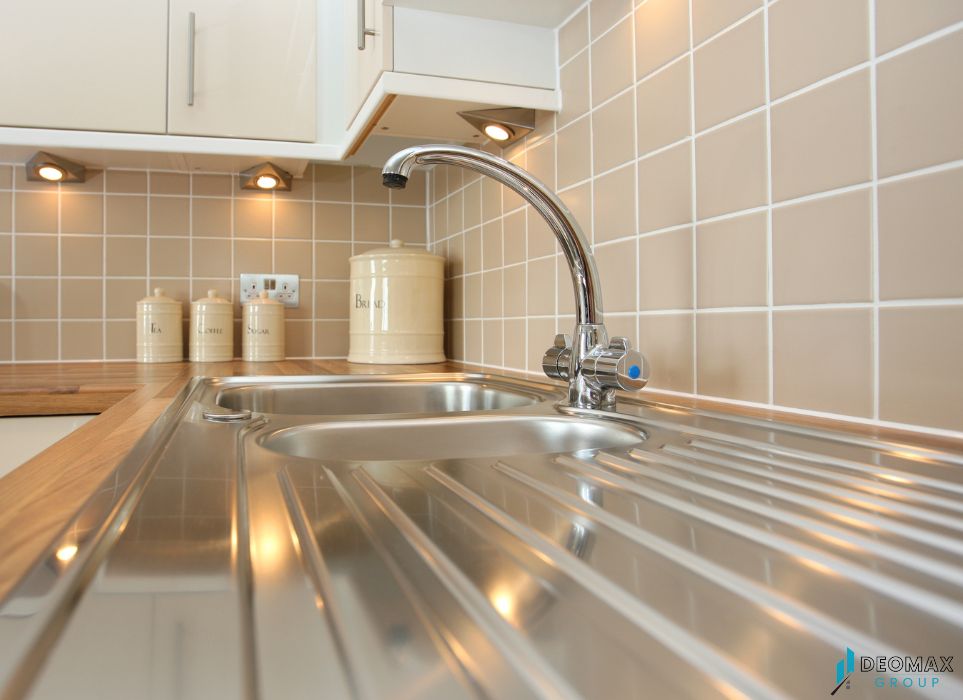Why Save Water?
For communities in Ontario, where water and energy resources are intertwined, the act of reducing water use can have far-reaching implications. It can alleviate the pressure on the city’s infrastructure, paving the way for a more sustainable urban development model. For homeowners, this translates into a dual benefit of supporting environmental sustainability while enjoying lower utility bills and an enhanced home value, as eco-friendly homes are increasingly sought after in today’s real estate market.
Understanding Your Home’s Water Use
A detailed assessment of your home’s water use is akin to a health check-up, identifying areas that need attention and improvement. This involves a meticulous review of indoor water use, including bathrooms, kitchens, and laundry areas, as well as outdoor usage like gardening and lawn care. High-resolution water usage monitoring can unveil surprising sources of waste, such as minor leaks that cumulatively account for thousands of gallons of water lost annually.
Educating homeowners about smart water practices is part of this assessment. For instance, simple behavioural changes, like turning off the tap while brushing teeth or fixing dripping faucets promptly, can significantly reduce water wastage. The goal is to foster a water-wise mindset, empowering homeowners with the knowledge and tools to make sustainable choices.
Key Areas for Water Efficiency Improvements
Kitchen Remodeling and Renovations
Appliances and Fixtures: Enhancing Efficiency
The kitchen serves as a critical area for implementing water efficiency in the home, with the choice of appliances and fixtures playing a significant role in reducing water usage. The evolution of kitchen technology has brought to the market appliances such as dishwashers and refrigerators that not only exceed their predecessors in efficiency but also incorporate advanced features aimed at conserving water. Notably, modern dishwashers are equipped with soil sensors that adjust water usage based on how dirty the dishes are, thus optimizing water use for each cycle. This smart technology ensures that the appliance uses only the amount of water necessary, preventing wasteful practices.
Water filtration systems in the kitchen also make a considerable impact, promoting the use of tap water over bottled water, which in turn reduces plastic waste and supports a healthier lifestyle. The integration of these systems into kitchen renovations is a step toward a more sustainable household by providing easy access to clean drinking water without the environmental toll of bottled alternatives.
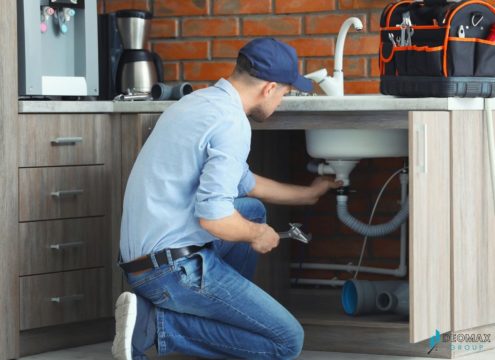
Efficient Dishwashing: A Holistic Approach
The strategy behind dishwashing is crucial for maximizing water efficiency in the kitchen. Modern dishwashers come with a variety of eco-friendly cycles designed to lower both water and energy consumption while still delivering clean dishes. These specialized cycles, which may include options like steam pre-wash or targeted washing zones, are engineered to tackle dirty dishes effectively, thereby eliminating the need for pre-rinsing under running water.
For homeowners looking to renovate their kitchens with water efficiency in mind, choosing appliances with these water-saving features is essential. Furthermore, adopting practices that complement the capabilities of these appliances can lead to even greater water savings. Ensuring the dishwasher is fully loaded before running it is a simple yet effective way to maximize efficiency, as it reduces the number of cycles needed over time.
In addition to smart appliance choices, kitchen design can contribute to water efficiency. For instance, installing a dual-sink setup can provide dedicated spaces for soaking and rinsing, reducing the tendency to leave the tap running. Similarly, choosing faucets with built-in aerators can significantly reduce water flow without compromising on functionality, ensuring that water is used more judiciously in daily kitchen activities.
By focusing on these aspects during a kitchen renovation, homeowners can significantly enhance the water efficiency of their space. The combination of selecting the right appliances and fixtures, incorporating water filtration systems, and adopting efficient dishwashing practices creates a comprehensive approach to conservation. This not only aligns with environmental sustainability goals but also offers the potential for long-term savings on water bills, making it a win-win for both the homeowner and the planet.
Bathroom Renovations to Improve Water Efficiency
Low-Flow Toilets and Showerheads: Maximizing Efficiency
Renovating the bathroom with water efficiency in mind has become a priority for modern homes, thanks to significant advancements in plumbing technology. Leading the charge are low-flow toilets and showerheads, designed to significantly cut water use without compromising performance. Low-flow toilets now utilize as little as 1.28 gallons per flush, a stark contrast to older models. This efficiency is achieved through improved engineering, ensuring effective flushes every time.
Dual-flush toilets add a level of customization, offering a reduced flush option for liquid waste, thereby enabling further water conservation. The inclusion of these toilets is a smart choice for homeowners seeking both environmental benefits and modern bathroom aesthetics.
Showerhead technology has also seen remarkable improvements. Modern low-flow showerheads reduce water flow to 2 gallons per minute or less without sacrificing water pressure, thanks to pressure-compensating flow regulators. These ensure a satisfying shower experience by maintaining consistent pressure, even with reduced water usage.
Thermostatic shower valves complement these water-saving measures by automatically adjusting water flow and temperature, reducing the water wasted while waiting for the shower to warm up. This feature not only saves water but also offers a consistently comfortable shower experience.
Water-Efficient Faucets: Innovations in Conservation
The latest in faucet technology offers effective ways to conserve water. Faucets now come with aerators that lower water flow but maintain the feeling of a strong stream by mixing air with water, reducing usage by up to 30% without impacting functionality.
Touchless faucets, which activate water flow only when necessary, further cut down on water waste. This technology is particularly effective in preventing unnecessary water flow, making it a suitable choice for both homes and businesses looking to enhance hygiene and efficiency.
For those not in a position to replace their entire faucet, installing flow restrictors is a straightforward and inexpensive solution. These devices can be added to existing faucets to immediately limit water flow, offering an easy way to achieve water savings without a full renovation.
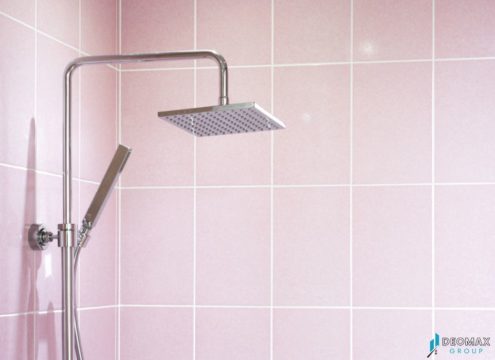
Embracing Water-Saving Practices
In addition to upgrading fixtures, adopting simple water-saving habits can significantly impact a household’s water consumption. Small actions, like shutting off the faucet while brushing teeth and repairing drips quickly, contribute to considerable water savings over time. Opting for shorter showers and being vigilant about leaks are additional ways to reduce water use, highlighting the role of mindful water consumption in daily life.
Basement Finishing to Improve Water Efficiency
Efficient water management in the basement is a cornerstone of sustainable home design, playing a pivotal role in preventing water waste and safeguarding against damage. A meticulously planned approach to waterproofing and drainage is essential for any basement finishing project, ensuring that your home remains dry, energy-efficient, and free from the detrimental effects of moisture intrusion.
Comprehensive Waterproofing
Waterproofing your basement goes beyond simply preventing water from entering; it involves creating a barrier against moisture that protects the structural integrity of your home. This process begins with an assessment of your home’s foundation, identifying potential entry points for water and vulnerabilities in the structure. Solutions may include the application of waterproof coatings or membranes on the exterior walls, which act as a first line of defence against water penetration. Additionally, interior waterproofing methods, such as sealants and waterproof paints, can be applied to basement walls and floors to prevent moisture from seeping through.
The importance of proper insulation in this process cannot be overstated. Insulation materials that are resistant to moisture not only prevent heat loss but also reduce the risk of condensation, a common cause of dampness in basements. Incorporating insulation into your waterproofing strategy enhances the overall efficiency of your home, leading to energy savings and improved indoor air quality.
Advanced Drainage Systems
An efficient drainage system is critical in managing water around your home’s foundation, directing it away from the structure to prevent accumulation and potential damage. The design of such systems often includes the installation of weeping tiles or perforated pipes at the foundation’s footing. These components work to collect excess groundwater and channel it safely away from the home, significantly reducing the risk of water intrusion.
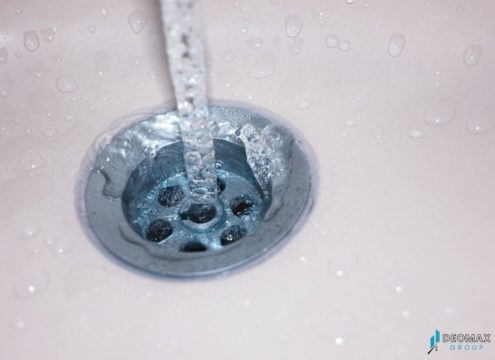
Implementing Your Water-Efficient Renovation
Choosing the Right Contractor
Selecting a contractor with a solid track record in water-efficient renovations is crucial. At Deomax Group, we pride ourselves on our comprehensive approach to sustainable renovations. Our team is fully licensed and insured, ensuring that every project we undertake meets the highest standards of quality and efficiency. We employ modern equipment and techniques to deliver water-efficient solutions that are both effective and environmentally responsible.
Final Thoughts
Renovating your home for better water efficiency is a journey toward sustainability that benefits both the planet and your pocketbook. By focusing on key areas like the kitchen, bathroom, and landscaping, and partnering with the right contractor, you can transform your home into a model of efficiency and conservation.
For those in the Greater Toronto Area looking to embark on this journey, Deomax Group is here to guide you every step of the way. With our expertise and commitment to excellence, we’ll help you achieve your water efficiency goals, ensuring your renovation project is a success. Contact us today at (647) 760-3999 for a free consultation and detailed quote, and take the first step towards a more sustainable home.

